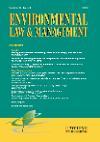ENVIRONMENTAL LAW AND MANAGEMENT - VOLUME 32 - ISSUE 4

Articles
Making environmental advertising claims: how to comply with the rules
TIMOTHY PINTO
Taylor Wessing, London
With growing consumer demand for ‘greener’ products, regulators are increasingly scrutinising businesses over their environmental advertising and marketing claims. This article looks in particular at the CAP Code and examines some key ASA rulings.
UK REACH: growing pains for the independent UK’s chemicals regulation
SIMON TILLING,TOM GILLETT
Steptoe & Johnson UK LLP, London
REACH is one of the legal regimes most impacted by Brexit. Despite the best efforts of officials working on the delivery of UK chemicals regulation, it is clear that a long-term policy is needed, backed with clear regulation, so that efforts in addressing the transition to an independent regime are not wasted.
Zambia-DR Congo cooperation agreements: an unsolicited commentary
NKUSUWILA NACHALWE-MBAO
Managing Partner,
Nkusuwila Nachalwe Advocates,
Lusaka
The cooperation agreements signed on 29 April 2022 between Zambia (a leading producer of copper) and the Democratic Republic of Congo (the world’s largest cobalt producer) provide an opportunity for both countries to move from exporting critical raw materials to adding value by manufacturing and exporting electric vehicle batteries. The agreements are also fundamental to enabling the countries to honour their nationally determined contributions and to reduce carbon emissions. It is, however, essential that they also plan for the recycling and safe disposal of EV batteries at the end of their useful lives.
Case Commentaries
WFD and Habitats Directive: the obligation to avoid deterioration of protected wetlands
SANTIAGO M. ÁLVAREZ CARREÑO
University of Murcia, Spain
The deterioration of habitats in the Doñana protected area in southern Spain has long been a cause of concern. Following the Commission’s action against Spain for failure to fulfil its obligations, Doñana continues to be designated a natural area at significant risk. This comment argues that the linking of the Water Framework and Habitats Directives, as established by CJEU doctrine, offers effective legal protection of the wetlands which simply awaits the implementation of effective measures on the ground.
Advice for directors in financial services in light of ClientEarth' s threat of legal action against directors of Shell
ISOBEL MCNAUGHT
Associate, Collyer Bristow LLP, London
ClientEarth recently took the first step in a legal action against the board of directors of Shell, notifying them of a potential claim for failing to adequately prepare the company for a transition to net zero and manage climate risk. According to ClientEarth, this poses serious questions for the long-term value of the company.
Does prudential policy have a role to play in tackling climate change?
SELMIN HAKKI
Slaughter and May, London
In 2022 climate change was officially incorporated into the core supervisory process of the UK Prudential Regulation Authority. A key question that emerges is whether the regulatory capital framework needs to be further enhanced to address climate-related risks, the answer to which will demand significant work and research.
Small modular reactors: the next generation of nuclear energy
ROSS HOWELLS, STEVEN JAMES
Burges Salmon, Bristol
Small modular reactors are smaller versions of traditional light water reactors and offer greater energy density than traditional nuclear power plants.Their size and flexibility enables them both to send power to the grid and to divert heat and power to other applications when needed. Their development is crucial in enabling nuclear power to contribute to the UK’s transition to net zero.
Developing the UK Emissions Trading Scheme
DALIA MAJUMDER-RUSSELL, VALERIE ALLAN, JAMES SNAPE
CMS Cameron McKenna Nabarro Olswang LLP, London
A recent consultation has proposed significantly expanding the scope of the UK ETS scheme in sectors already covered – energy intensive industries, power generation and aviation. It also sought evidence on potential future developments, including future markets policy, incorporating greenhouse gas removal into the scheme, and addressing greenhouse gas emissions in land use and agriculture.
News Reports
Behind the Headlines
Trustee investment policy: Butler-Sloss & Others
FRANK CRANMER
St Chad’s College, Durham and Cardiff Law School
